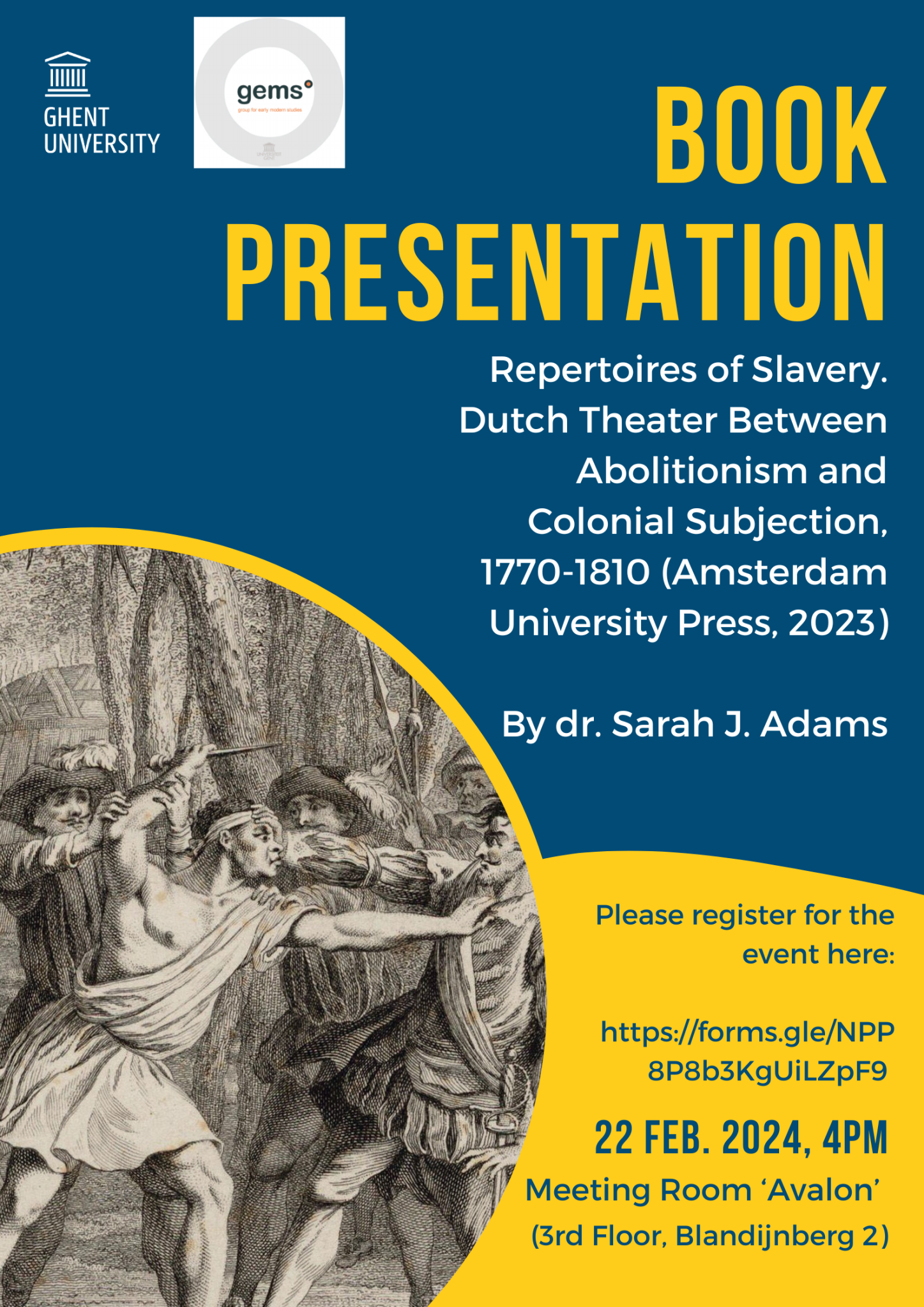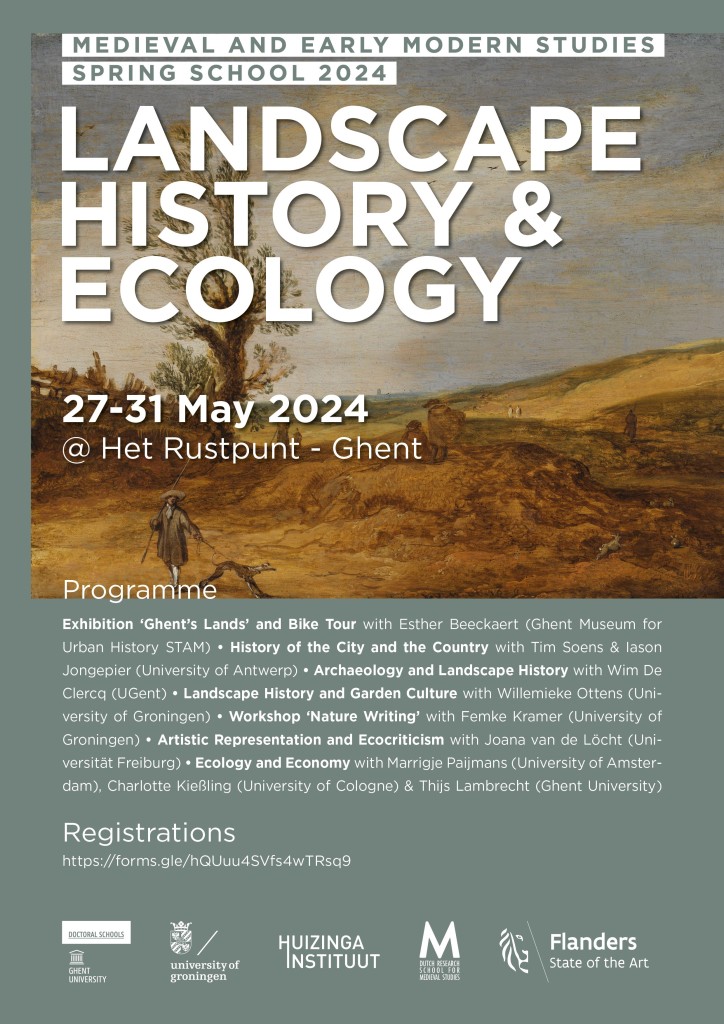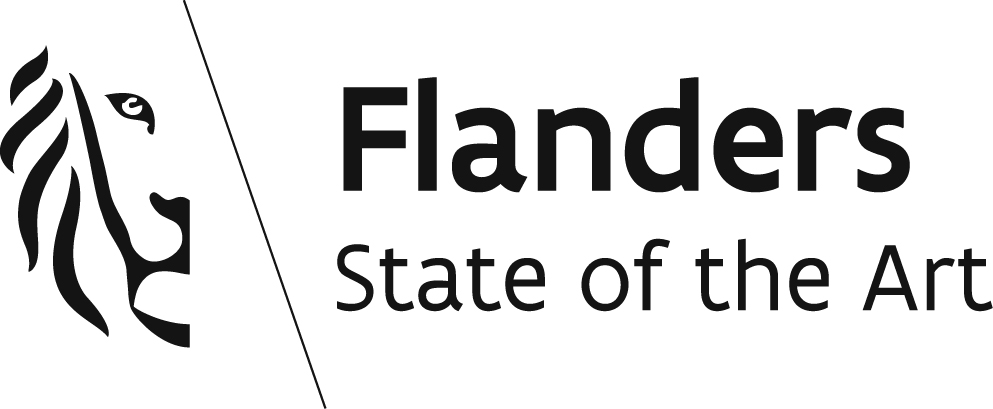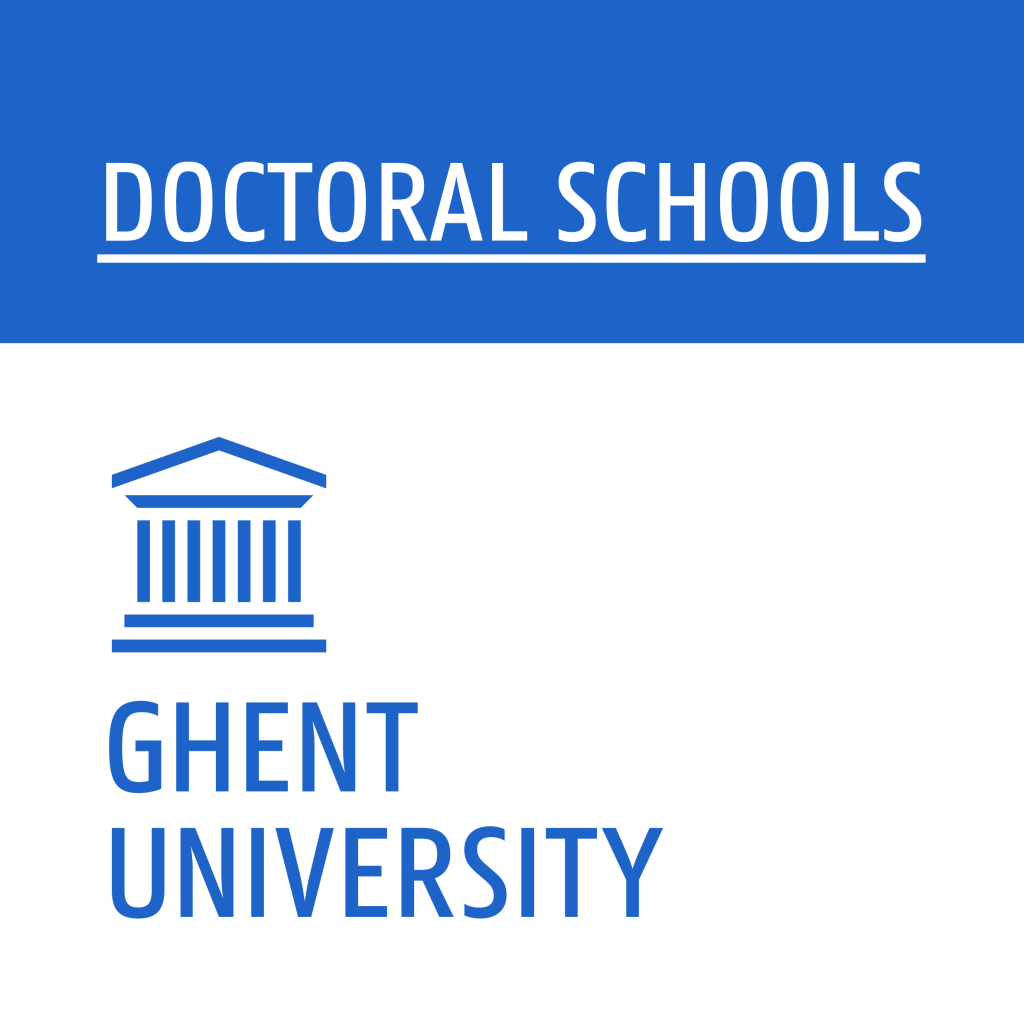Past events (from 1/4/2024)
For older events and projects visit our old website
-
Wed25Jun20252:30pm-4pmFaculteitszaal (1st floor, Blandijnberg 2)
Roundtable: “Literary Afterlives, from the Eighteenth Century to the Present”
Show contentThis interdisciplinary roundtable will explore the rich and varied afterlives of eighteenth- and nineteenth-century literature in contemporary media, culture, and criticism. A panel of leading scholars in literary studies will delve into how historical figures and forms—from seafaring pirates and biting satirists to queer protagonists and Enlightenment thinkers—continue to shape cultural narratives today. Our discussion will examine the reimagining of early modern tropes in contemporary literature, film, and television; the resonances of eighteenth-century satire in postcolonial thought; and the legacy of Enlightenment ideals in current debates on religious toleration. By interrogating how the past is adapted and reframed in the present, the roundtable promises to offer fresh insights into literature’s role in navigating ongoing conversations around gender, identity, colonialism, and belief.
The event will conclude a lively Q&A session and an informal reception to encourage further exchange.
Speakers:
Manushag Powell, Arizona State University
David Alvarez, DePauw University
Ros Ballaster, Oxford University
Helen Deutsch, UCLAChair: Andrew Bricker, UGent
-
Mon26May202517:00Camelot (Room 3.30, Blandijnberg 2)
Talk: Debating Private Censorship and Family Networks from Florence to Flanders: Lodovico Guicciardini’s Letters and the Publication of Francesco Guicciardini’s “Ricordi” by Dr. Jonathan Schiesaro
Show contentGEMS is organising a talk by Dr. Jonathan Schiesaro on ‘Debating Private Censorship and Family Networks from Florence to Flanders: Lodovico Guicciardini’s Letters and the Publication of Francesco Guicciardini’s "Ricordi"’.
This talk explores the epistolary and editorial activity of Lodovico Guicciardini (1521-1589) between the events surrounding the publication of the first edition of Francesco Guicciardini’s History of Italy (1561), edited by Lodovico's cousin Agnolo di Girolamo (1525-1581), and the Antwerp edition of the Ricordi (1585). Through a close reading of his correspondence and early printed materials within the Flemish context, the talk examines how private censorship and family networks shaped the reception of Italian historical culture and political thought on the periphery of the Counter-Reformation.
Jonathan Schiesaro (PhD, University of Zurich) is a research fellow of the Irish Research Council at Trinity College Dublin, where he works on a project focused on the transmission and manipulation of documentary heritage within Florentine patrician families (including the Vasari, Bandinelli, Buonarroti, Machiavelli, Guicciardini, and Ammirato) under the early Grand Dukes of Tuscany. His main research interests include Renaissance art treatises, memory writing, and historiography. He published the monograph Baccio Bandinelli e le anatomie degli scartafacci: il "Libro del disegno", l'archivio di famiglia e la questione del "Memoriale" (Berlin: De Gruyter, 2023).
-
Wed07May2025Fri09May2025Het Rustpunt, Burgstraat 110-16, Ghent
Conference: Women in the History of Political Thought
Show contentMore and more exciting research is being produced by scholars of political theory and related fields––such as political science, history, and political philosophy––exploring the contributions of women to the history of political thought. This three-day WHPT conference is an important step towards bringing these scholars together, with the aim of fostering new intersections and inspiring future research.
Find the full conference program below.
This conference is organized by Torrey Shanks (University of Toronto), Mary Jo MacDonald (University of Jyväskylä), and Geertje Bol (Ghent University). It is generously funded by Social Science and Humanities Research Council of Canada, the Strategic Institutions Partnerships grant from Ghent University, the University of Toronto Scarborough Campus, and the Gender in Renaissance and Early Modern Philosophy project at the University of Jyväskylä.
Visit the website for more information.
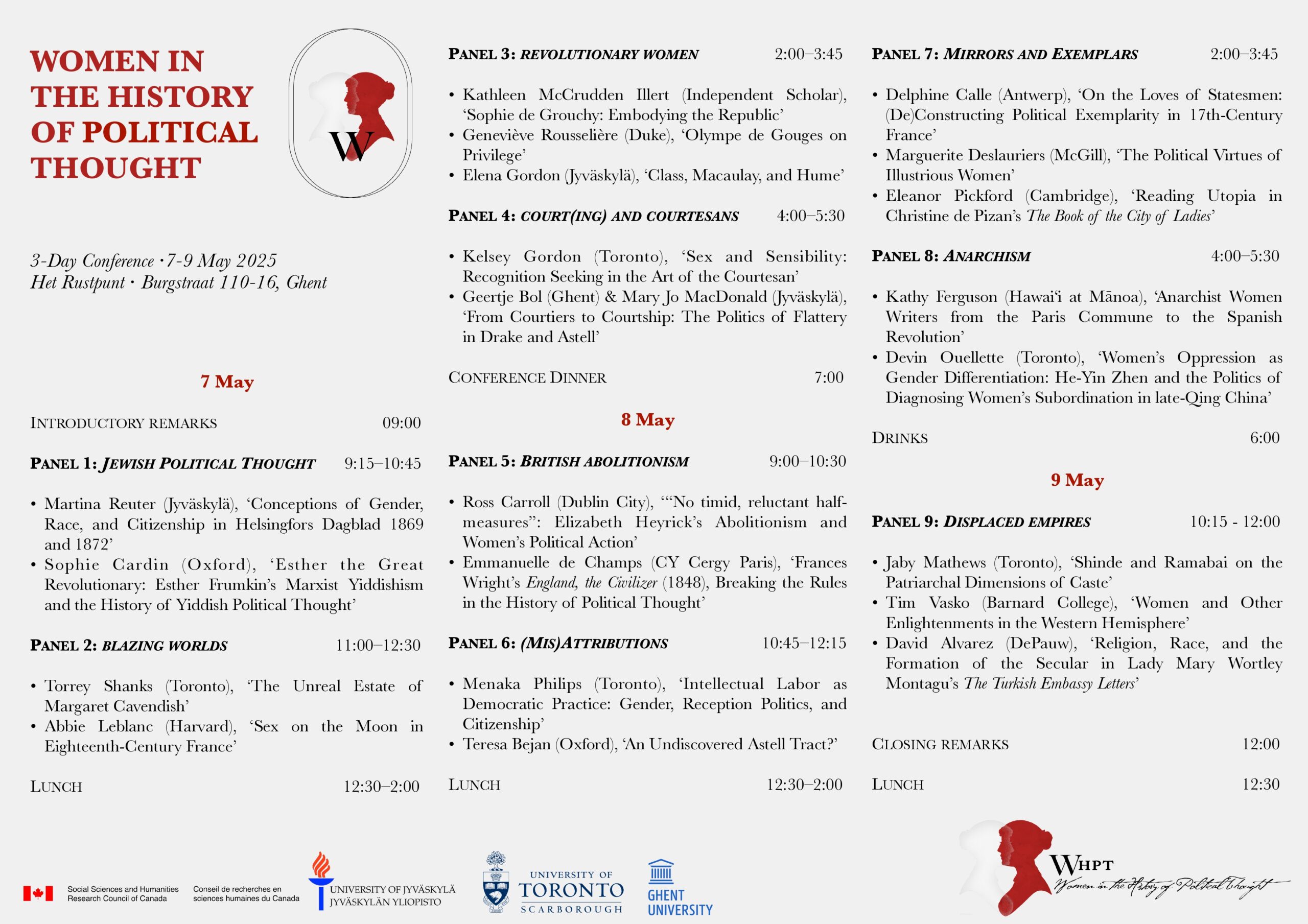
-
Wed07May202517:00Camelot (Room 3.30, Blandijnberg 2)
Talk: New Research Perspectives on Italian Vernacular Rhetorics of the 16th Century by Dr. Elena Bilancia
Show contentGEMS is organising a talk by Dr. Elena Bilancia on ‘New Research Perspectives on Italian Vernacular Rhetorics of the 16th Century’.
The development of vernacular rhetorical theory played a key role in the intellectual culture of the Italian and European Renaissance. During the 16th century, the growing need to establish an autonomous set of rhetorical principles, crafted by (and for) literary professionals rather than university professors, extended beyond humanistic pedagogy and the formation of the ideal vir bonus dicendi peritus. It also addressed the changing role of intellectuals and their evolving relationship with cultural, political, and religious institutions, especially in the turbulent period between the end of the Italian Wars and the onset of the Counter-Reformation. Italian intellectuals made an original contribution to rhetorical theory not only through their exegetical work on ancient texts but also by exploring the potential of the vernacular language in the extra-university cultural circuits. It was particularly within the Infiammati Academy of Padua that a defence of the practical and civic function of elocutio was elaborated. The objective of Elena Bilancia’s research is therefore to identify the specific cultural projects that contributed to the foundation of an Italian vernacular rhetoric within the complex framework of European humanisms.
Elena Bilancia obtained her PhD in Philology and in Italian Studies from the universities of Naples Federico II and Paris 8 Vincennes – Saint-Denis. She is currently a research fellow at the Scuola Superiore Meridionale and a contract lecturer in Italian Literature at the Department of Humanities at Federico II. Her research interests focus on vernacular dialogue production and Renaissance lyric poetry. She has worked on authors such as Boccaccio, Machiavelli, and Torquato Tasso. In 2024, she published the monograph Il dialogo in volgare. Forme dell’argomentazione retorica nel XVI secolo with Bit&s.
-
Wed23Apr2025from 3pm Library Lab (Magnel)
Young Researchers Day
Show contentGEMS (Group for Early Modern Studies) is organising a work-in-progress session for MA students working in early modern (broadly defined) studies. We want to create a low threshold and open setting for students to present their work and receive useful feedback.
In this session, students will give a poster presentation (in English) on their current research. The presentation aims to help students fine-tune their research and is a great opportunity to get feedback from your peers and experienced researchers in the field of early modern cultural history and literature. The presentation can be about a specific chapter or your research methodology, or an outline of your thesis. We don’t expect your research to be in a finalised stage: feel free to come with drafts and invite your peers to think along with you!
The seminar will take place on Wednesday 23 April 2025 from 3pm. We aim for seven-minute presentations with ample time for questions. GEMS will finance the print costs for the posters. Refreshments will be provided.
Register for the Young Researchers Day via this form.
If you have any further questions, please contact Caroline.Baetens@UGent.be or Eru.Fevery@UGent.be.
-
Mon24Mar2025Fri28Mar2025Groningen
Medieval and Early Modern Studies Spring School 2025
Show contentMedieval and Early Modern Studies Spring School: History of Emotions – Groningen, 24-28 March 2025
This Spring School is organised by the University of Groningen, Ghent University, the Huizinga Institute and the Dutch Research School for Medieval Studies to stimulate contacts and exchange between PhD candidates and ReMa students in the field of the history of emotions, a flourishing research field that connects different disciplines within the humanities, as well as between SSH and the (neuro)sciences. At least six of these disciplines will be represented in this course: cultural history, neurosciences, literary studies, art history, creative writing and musicology. The aim of the course is not to provide an introduction in the field but to deepen the participants’ knowledge of four topical angles through which emotions in history can be studied. The course will mainly focus on the Middle Ages and the Early Modern Period, but students working on Antiquity or the Modern Period can attend as well.
Topic
The history of emotions is a scholarly field that came into existence almost 20 years ago and since then has realised major breakthroughs, most notably because of its interdisciplinary character. Unsurprisingly, also among young scholars in the field of medieval and early modern history there is a renewed interest in the history of emotions and its theoretical and methodological framework. The focus of scholars in the field has long been on the investigation of emotional norms, regimes, and communities, with the pioneering work of scholars such as Barbara Rosenwein and William Reddy. Monique Scheer introduced the idea of ‘doing emotions’, paying more attention to the performative aspect of emotional language, as well as cognitive processes and the idea of embodied knowledge. Other scholars focused explicitly on the role of emotions in processes of knowledge acquisition, ecological change and in ‘affective economies’. Many doctoral students interested in the field will be familiar with at least some of these approaches. This Spring School will provide them the opportunity to deepen this knowledge and to get familiar with topical debates in the field. Special attention will be given to digital methods, postcolonial approaches and the ´´´´´´relevance of neuroscience for historical research.
Approaches
This course takes four recent lines of research and the concepts associated with them as a starting point: digital approaches, rhetoric, well-being & art and decolonialty. Nine specialists will reflect from their scholarly background (cultural history, medieval history, literary studies, creative writing, art history, musicology, digital humanities and neurosciences) on how they define and apply the above-mentioned concepts in their own research. An accompanying reading list underpins further reflection and discussion with the participants. This will offer students a stepping stone to think these concepts in relation to their own work. Through short pitches the attending PhD students will concretely reflect on the possibilities and difficulties of working with the same concepts in their own research projects. More informal talks about the history of emotions will be possible during a thematic walk through Groningen and a workshop in creative writing and emotions. The Spring School will also provide a workshop on digital approaches of emotions in history.
Programme
Session I: Walk through Groningen: Revolution and Emotions – guide/lecturer: Renée Vulto (Utrecht)
Session II & III: Methodology and Digital Approaches – lecturers: Francesco Buscemi (Groningen) and Lucas van der Deijl (Groningen)
Session IV & V: Emotions and Rhetoric – lecturers: Janne Lindqvist (Uppsala) and Steven Vanderputten (Ghent)
Session VI & VII : Art, Mind and Well-being – lecturers: Jacomien Prins (Utrecht), Nicole Ruta (Leuven) and Gemma Schino (Groningen)
Session VIII & IX: Writing, Emotion, and Decoloniality – lecturers: Marrigje Paijmans (Amsterdam) and Femke Kramer (Groningen)
Registration
PhD students and ReMa students are invited to register for this course before 10 January 2025 through the link. Please note that there is a limited number of places available for this course. After your registration you will soon receive more information about whether your registration can be confirmed or not. Some of the participating graduate/doctoral schools will cover tuition and lodging for their participating members (please wait for more information after your registration).
Organising institutions and partners
This Spring School is organised by Ghent University (Doctoral Schools), the University of Groningen, the Huizinga Institute and the Research School for Medieval Studies in cooperation with the following research groups: the Groningen Research Institute for the Study of Culture (Rijksuniversiteit Groningen), the Group for Early Modern Studies (UGent), the Henri Pirenne Institute for Medieval Studies (UGent), the Amsterdam Centre for Studies in Early Modernity (UvA), Amsterdam Centre for Cross-Disciplinary Emotion and Sensory Studies (VU A’dam), the Amsterdam Centre for Studies in Early Modernity (UvA), the Institute for Early Modern History (UGent-VUB) and the Onderzoeksgroep Nieuwe Tijd (KU Leuven).
Organising committee
Estel van den Berg, MA (UGent, Group for Early Modern Studies), Dr. Femke Kramer (Rijksuniversiteit Groningen, Research Institute for the Study of Culture), Dr. Stefan Meysman (UGent, Henri Pirenne Institute for Medieval Studies), Prof. Bart Ramakers (Rijksuniversiteit Groningen, Research Institute for the Study of Culture), Dr. Lucas van der Deijl (Rijksuniversiteit Groningen, Research Institute for the Study of Culture), Dr. Lies Verbaere (UGent, Group for Early Modern Studies) and Prof. Kornee van der Haven (UGent, Group for Early Modern Studies)
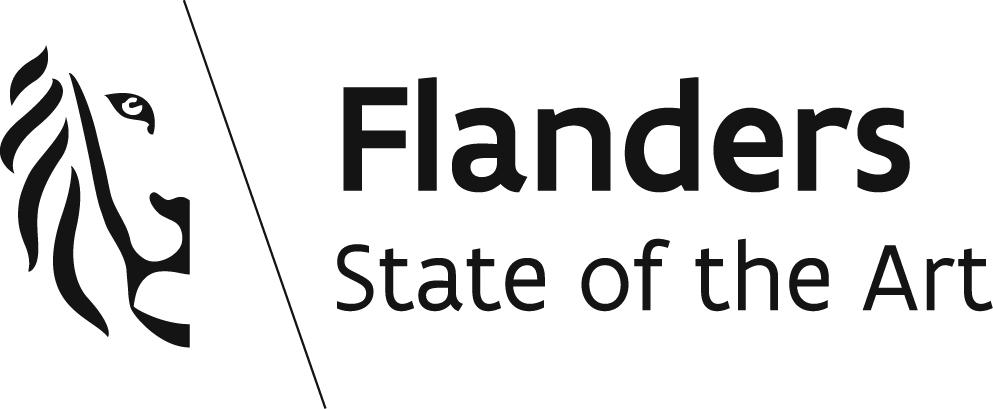
-
Wed05Mar20253-4PMCamelot, Blandijnberg 2
Talk: ‘The Map After the Shipwreck: Angelo Poliziano and the Encyclopedic Ideal’ by Dr. Francesco Caruso
Show contentGEMS is hosting a talk by Dr. Francesco Caruso on Angelo Poliziano and the encyclopedic ideal.
For early humanists, engaging with the classics was an integral part of their intellectual activity. The inventory of what remained after the shipwreck of the ancient world became the battlefield where “the best minds of three generations” clashed, in the attempt of incorporating this or that author to their range of expertise. In the late 1480s, during the opening of the academic year at the University of Florence, the Tuscan poet and humanist Angelo Poliziano (1454–1494) delivered a prologue, the Panepistemon. This work implicitly certified that the efforts of his predecessors had been short-sighted. Not only did they demonstrate a limited or non-existent knowledge of the Greek language, but they also focused on a narrow range of ancient authors, mostly poets, historians, and orators. For Poliziano, this highlighted the need to create a vast encyclopedic project to reorganize the entire intellectual heritage of Greek and Latin output, including, among others, philosophy, sciences, and the law.
Dr. Francesco Caruso has a double background, legal and literary. He graduated from the School of Law in Palermo and holds a MA from University of Pennsylvania and a PhD from Johns Hopkins University. His main areas of research are the Italian Quattrocento, Neo-Latin literature and intellectual history. He has primarily published on Boccaccio and Poliziano, to whose intellectual biography he devoted his dissertation. He currently teaches Italian language and literature in the International Baccalaureate Program at the Gonzaga Campus in Palermo and works also as a professional translator. His current projects concern Cristoforo Landino’s Disputationes Camaldulenses but he is also conducting archival research on the Hortus Catholicus, one of Europe’s earliest botanical gardens.
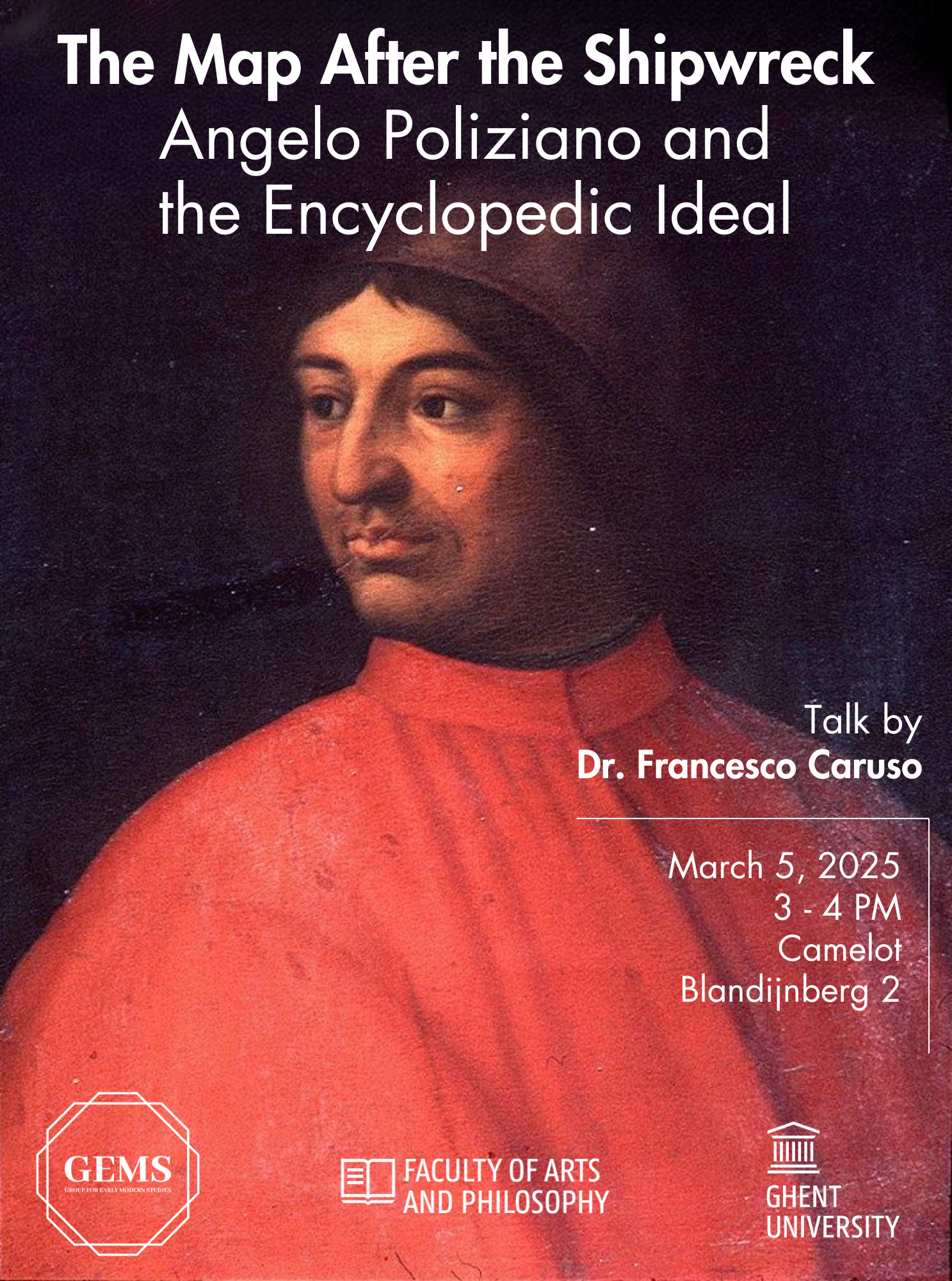
-
Wed19Feb20252:30pm-3:30pmAuditorium B, Rozier 44
Talk: Religion, Race, and the Formation of the Secular in Lady Mary Wortley Montagu’s The Turkish Embassy Letters by David Alvarez
Show contentGEMS is hosting a talk by Prof. Dr. David Alvarez (DePauw University) on religion, race, and the formation of the secular in Lady Mary Wortley Montagu’s The Turkish Embassy Letters.
Europe and Islam, feminism and the veil, orientalism, empire, and race: there are few works of eighteenth-century British literature that seem as topical as Lady Mary Wortley Montagu’s The Turkish Embassy Letters (1763). One of the first women to describe her travels to the Ottoman Empire, and one of the first Europeans to visit women-only spaces there, Montagu praises many aspects of Ottoman culture and society, most notably the liberty of the “Turkish ladies,” who are, she claims, “(perhaps) freer than any ladies in the universe.” Hailed in the last thirty years as a proto-feminist Enlightenment effort to overcome the East/West divide, her literary account of her travels from 1716-18 through Europe, Africa, and the Ottoman Empire has been seen as promoting “peaceful cosmopolitan intercultural exchange” and heralding “the advent of European secularism.” The Letters’ topicality, however, has unfortunately had the effect of limiting scholars’ attention to Montagu’s descriptions of the Ottoman empire, which make up less than half the book. By ignoring her account of her travels through Roman Catholic Europe, we miss seeing how Montagu represents Ottoman alterity by projecting outward from England a distinction that is internal to Christianity: the divide between Roman Catholicism and Protestantism. This divide in her work is more fundamental than that between East and West. It grounds not only her criticisms of Roman Catholic Baroque Europe as benighted, backwards, and absolutist but also her celebration of the Ottomans for their polite sociability, tolerant cosmopolitanism, and liberty for women. If it is through these binaries that her work contributes to the formation of the secular, they also explain how Montagu conceptualizes race and anti-Black racism in her letters about North African women, who are represented as having more in common with Roman Catholics than Ottoman Muslims.
Prof. Dr. David Alvarez (DePauw University) is a Fulbright scholar this year at Ghent University, and is currently finishing a book manuscript on “Imagining Global Religion: Secularity, Religious Toleration, and Empire in the English Enlightenment.” He has published internationally on eighteenth-century English literature and philosophy, focusing on religious toleration, aesthetics, and the Third Earl of Shaftesbury. With Prof. Alison Conway, he has also edited a book collection of essays, Imagining Religious Toleration: A Literary History of an Idea, 1600-1830. His course on “Staging World Religions and the Formation of the Secular in Restoration Drama” builds on his book project by examining how Restoration drama contributes to changes in the meaning of “religion” and to what ethical, secular, and imperial ends.
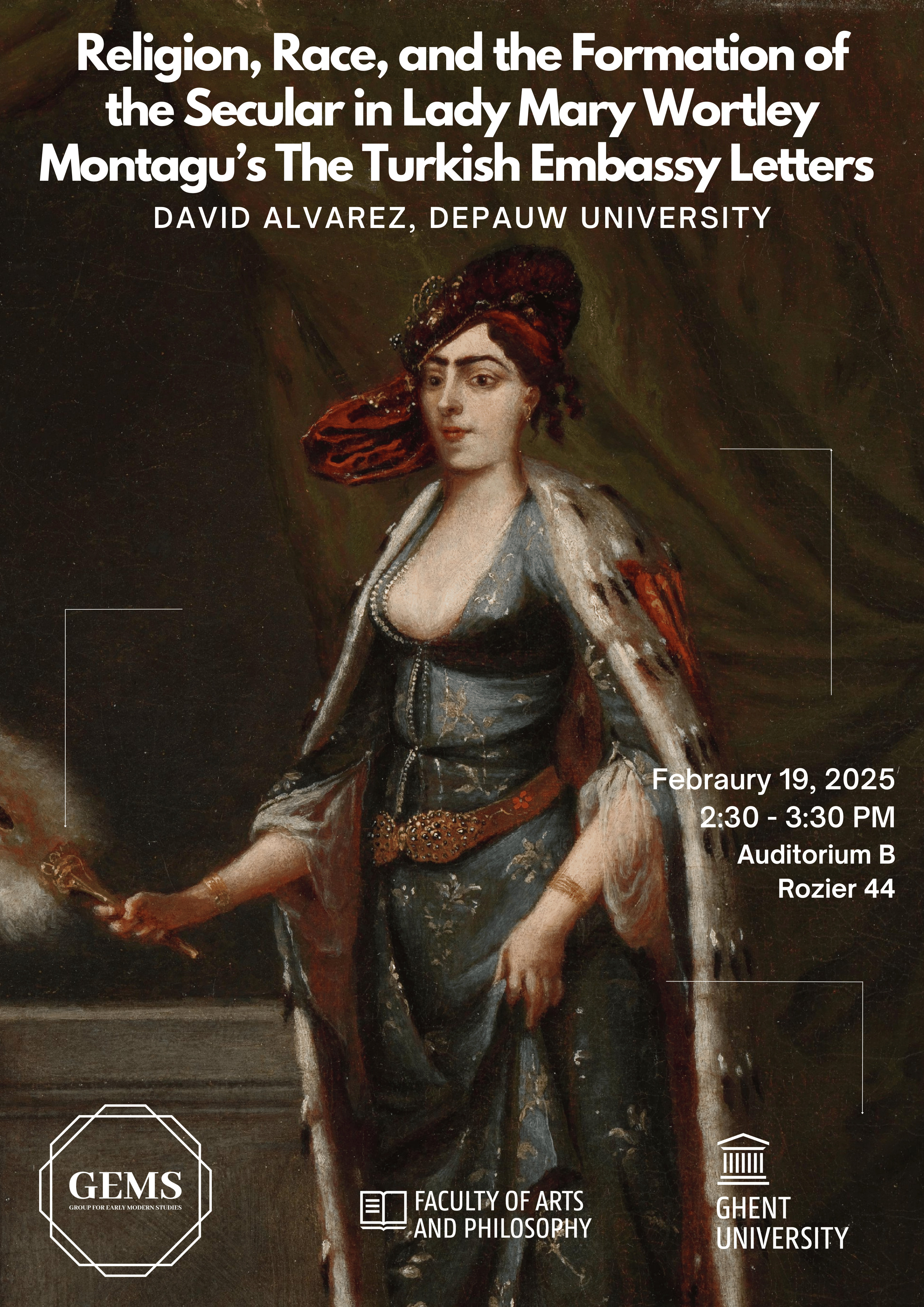
-
Fri14Feb20252pm-4pmBlandijnberg 2, Room 3.30 - Camelot
Feedback Session for FWO Applicants
Show contentGEMS is organising a feedback session for FWO-applicants in the field of early modern studies*.
In this session, MA students applying in March 2025 to the FWO (or in the subsequent year, but who have already completed their application) will share their application with the attendees: PhD and senior researchers in the field of early modern studies, and other students. They will also briefly present their research in a 5-minute presentation (in English), followed by ample time for feedback and discussion.
The goal of this session is for students to receive useful feedback on their research and application from different experienced researchers to finetune their project before applying to the FWO.
The session will take place on the 14th of February from 2pm.
Student can register via this form or the QR-code.
If you have any questions, please contact Eru.Fevery@UGent.be or Joris.Verschelde@UGent.be*Researchers focusing on adjacent time periods are also welcome!
-
Tue07Jan20253pm - 5pmBlandijnberg 2, lokaal 3.30 - Camelot
Seminarie ‘Verbeelding van verlangen in vroegmoderne Nederlandse komedies’
Show contentSeminarie ‘Verbeelding van verlangen in vroegmoderne Nederlandse komedies’
This event will be held in Dutch
Sara Troost, Wie nog lopen kon ging; wie dat niet meer kon, viel om (1768), via: https://id.rijksmuseum.nl/200310259
Op 7 januari 2025 organiseert de onderzoeksgroep Vensters van Verlangen: de verbeelding van consumptie in de komedie van de Lage Landen (1650-1725) in samenwerking met GEMS en Thalia een seminarie over de verbeelding van verlangen in komisch toneel in de zeventiende en achttiende eeuw. Vensters van Verlangen onderzoekt de representatie van consumptie en verlangen in vroegmoderne Nederlandse komedies. Kluchten en blijspelen vormen een vruchtbare bron voor het bestuderen van emoties en consumptie, omdat zij veelal handelen over herkenbare sociale omgevingen en kwesties en blijk geven van contemporaine morele en sociale waardeoordelen. In dit seminarie behandelen Estel van den Berg en Evi Dijcks de verbeelding van twee centrale verlangens: geldzucht en seksuele lust.
Geldzucht was een populair thema in kluchten en blijspelen in de vroegmoderne tijd en ging altijd samen met humor over klasse. Stereotype personages zoals de vrek en de sociale klimmer kwamen veelvoudig voor in komedies. Estel van den Berg presenteert aan de hand van een aantal scènes uit D’ingebeelde Ryke (1665) van Joost van Breen, De woekeraar (1702) van Abraham Alewijn en Quincampoix (1720) van Pieter Langendijk welke theatrale technieken werden ingezet om het verlangen naar rijkdom te verbeelden. Zij onderzoekt of rijkdom enkel een voorwaarde was om te kunnen consumeren, of dat het najagen van rijkdom werd gerepresenteerd als doel op zichzelf. Zij onderzoekt welke rol komedies hadden bij het distribueren van het verlangen naar rijkdom en wie in de zeventiende en achttiende eeuw mocht verlangen naar rijkdom.
Een ander geliefd onderwerp van toneelschrijvers was seks en seksueel verlangen. In kluchten en blijspelen leidt dat verlangen regelmatig tot overspel. Op het toneel worden vaak negatieve stereotype genderrollen getoond, waarmee de gebruikelijke hiërarchie tussen man en vrouw tijdelijk wordt omgekeerd. Het gebruik van humor biedt zo ook de mogelijkheid een alternatieve werkelijkheid te verbeelden, waarin meer subversieve ideeën de ruimte krijgen. Aan de hand van een tegendraadse lezing presenteert Evi Dijcks welke alternatieve denkbeelden rondom overspel op het vroegmoderne podium worden gerepresenteerd.
Na de presentaties is er ruimte voor vragen en discussie. Wie wil deelnemen aan het seminarie kan een e-mail sturen naar evi.dijcks@ugent.be.
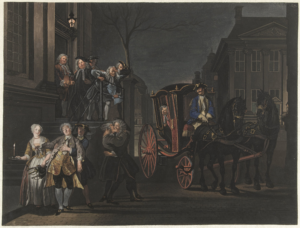
-
Tue17Dec202418:00Auditorium C, Plateaustraat 22
Lecture: The Notion of Mannerisms in 20th Century Architectural Culture
Show contentArchitecture’s Mannerisms, or the Modern Path of an Unstylish Style
The department of Architecture and Urban Planning is hosting a lecture by Andrew Leach (University of Sydney) on the notion of mannerisms in 20th century architectural culture. This talk reports on a book begun at Harvard’s Center for Italian Renaissance Studies at the Villa I Tatti. It reflects on the work done by a modern and evolving concept of architectural mannerism for architecture itself. How has mannerism, it asks, shaped architectural values—directly and obliquely? What does it tell us about modern architecture’s relationship with history? Tracking the ebbs and flows of mannerism’s presence in architectural debate offers a way to think about the construction of architecture as a field apart, and as a profession subject to corruption.
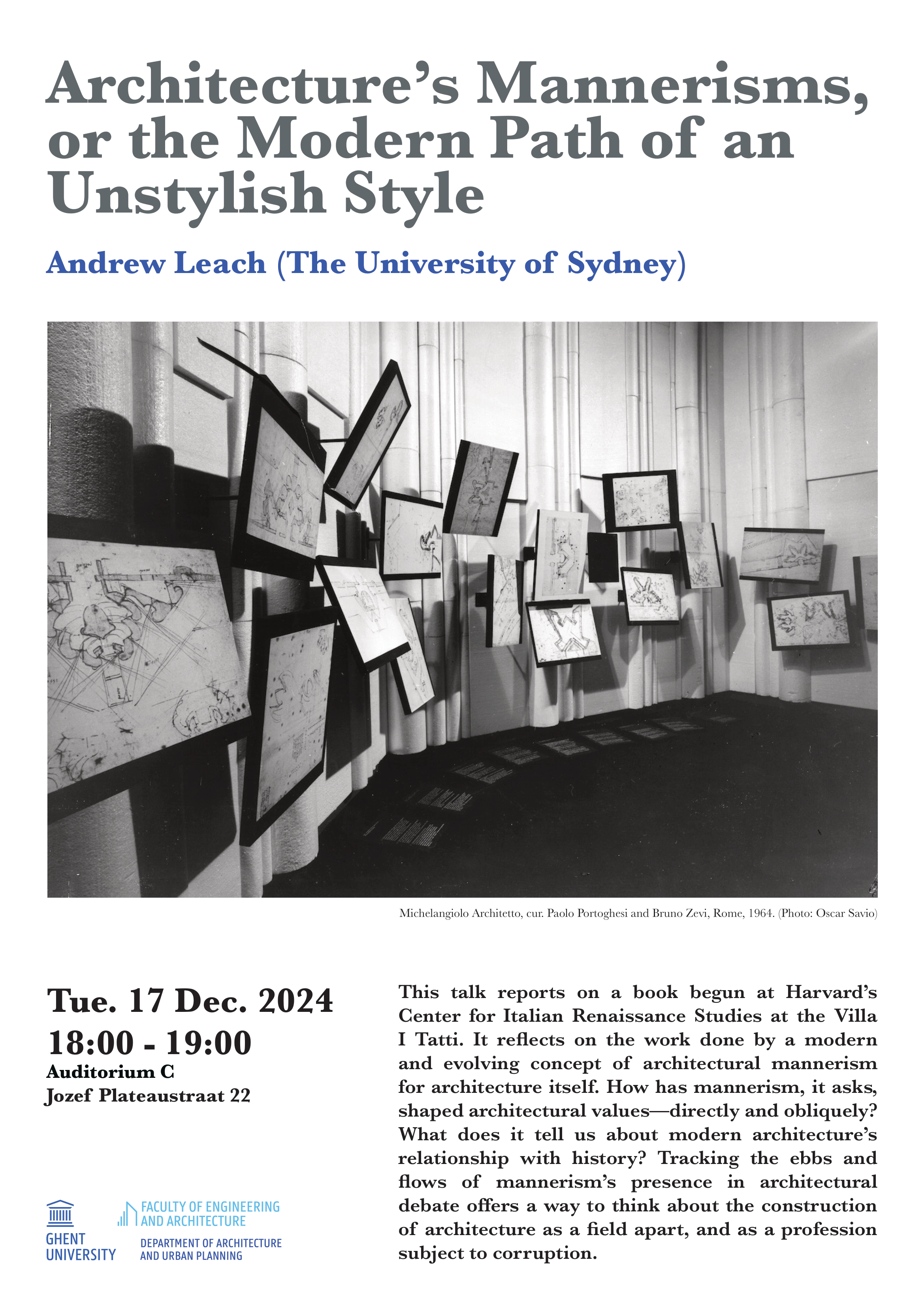
-
Thu12Dec20244pm-6pmRozier 44, Room 1.2
Seminar: The Order and Disorder of Communication in the Early Modern Ottoman Empire
Show contentMiddle East Studies Research Seminar Series - with Prof. Dr. Nir Shafir (UC – San Diego)
In the seventeenth century, Muslims in the Ottoman Empire became embroiled in a polarizing cultural war over the permissibility of everyday practices like worshipping at saints’ graves, smoking tobacco, and an odd medical procedure called “chickpea cauterization.” This talk traces this widespread religious and political polarization to the rise of a new “communication order,” focusing, in particular, on the advent of “pamphlets”: short, mobile, and polemical tracts, all copied by hand. The talk paints a new picture of the entire ecosystem of books in the manuscript culture of the early modern Ottoman Empire and how it fell into supposed disorder as middling readers stoked polemics, falsified authorship, and fashioned new reading publics.
contact: middleeast@ugent.be
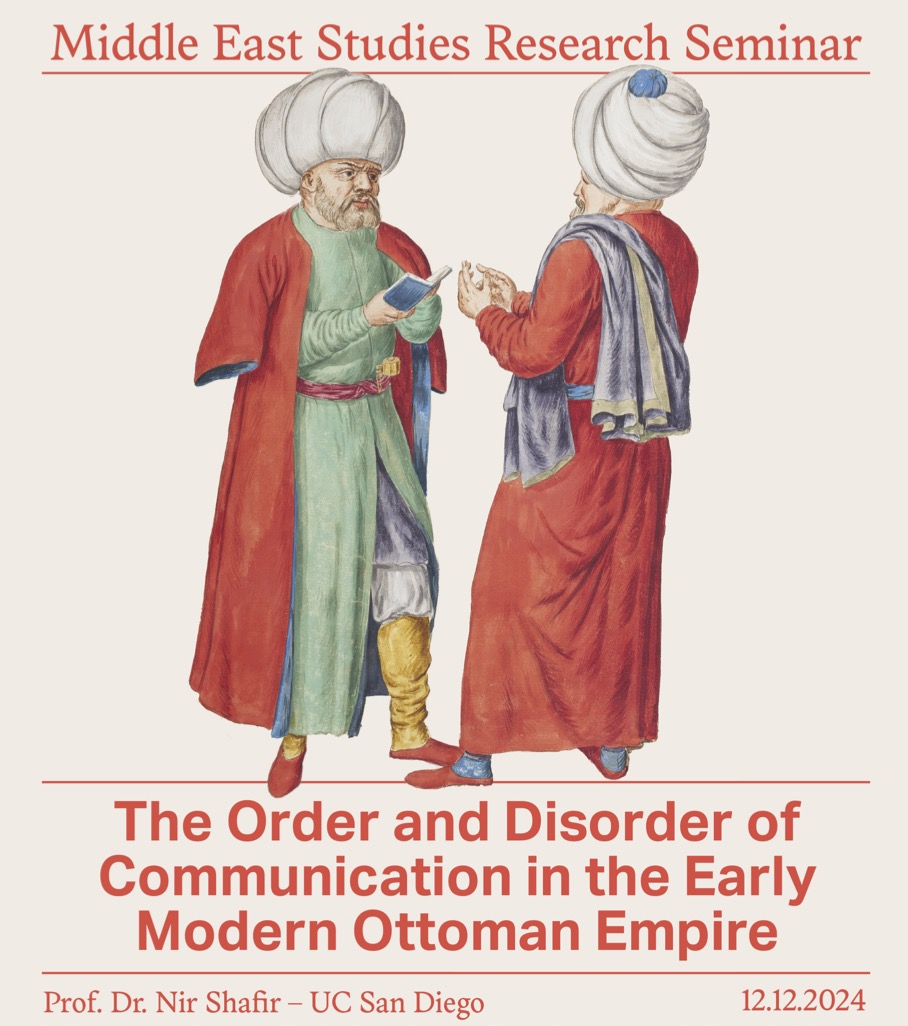
-
Tue26Nov202419u30-21u00Bibliotheek De Krook, zaal De Blauwe Vogel (via Platteberg 11), Gent
Boekvoorstelling: Een avond over Elizabeth Wolff: een moedige schrijfster uit de Verlichting.
Show contentBoekvoorstelling biografie door Marita Mathijsen en panelgesprek met Annelies Verbeke en Tom Verschaffel
Registreren voor 22-11 via: https://event.ugent.be/registration/wolff
Dit najaar verschijnt Een vrije geest: Het uitzonderlijke leven van Betje Wolff bij Uitgeverij Balans. Elizabeth (Betje) Wolff schreef samen met Agatha Deken de roman Sara Burgerhart die in Nederland onderdeel is van de historische canon. Met dit boek krijgt Elizabeth Wolff haar eerste solo-biografie. Marita Mathijsen komt naar De Krook om er deze biografie voor te stellen en in te gaan op het turbulente leven van de schrijfster. Daarna zal zij in gesprek te gaan met Annelies Verbeke en Tom Verschaffel, over de positie van vrouwelijke auteurs in de achttiende eeuw en nu. Waarom wordt het werk van getalenteerde schrijfsters zo weinig gelezen? Waarom ontbreekt de Verlichting in de Vlaamse literaire canon? En waarom is het voor vrouwelijke auteurs nog steeds lastig om een plek in die canon te krijgen? Moderator: Kornee van der Haven.
Over Elizabeth Wolff
Het leven van de achttiende-eeuwse schrijfster Elizabeth (of Betje) Wolff is ongekend opwindend en haar schrijverschap is meesterlijk. Geen vrouw wist ooit zo spottend tegen het orthodoxe geloof te schrijven. Ze nam ferm stelling tegen de onderdrukking van vrouwen, tegen de slavernij, tegen dierenmishandeling, vóór natuurwaardering, vóór democratisch bestuur. Dat maakt haar uniek, niet alleen toen, maar ook nu nog. Ze stond al in heel letterenland bekend als schrijfster toen ze Agatha (of Aagje) Deken leerde kennen, die nog geen naam had. Samen schreven ze het succesboek Historie van mejuffrouw Sara Burgerhart. Op haar vijftigste vluchtte ze vanwege de politiek met Aagje naar Frankrijk. Negen jaar later kwamen ze gedesillusioneerd terug. Hun succesjaren waren toen voorbij. In 1802 overleden de twee vriendinnen, kort na elkaar.
Marita Mathijsen
Marita Mathijsen is cultuurhistorica en emeritus hoogleraar Nederlandse literatuur aan de Universiteit van Amsterdam. Ze is bekend om haar werken over vooral de negentiende eeuw: De geest van de dichter, De gemaskerde eeuw, Historiezucht, L: de lezer van de 19de eeuw en haar veelgeprezen biografie Jacob van Lennep: Een bezielde schavuit. Haar werk verscheen op de short lists van de geschiedenisprijs en de biografieprijs.
Annelies Verbeke
Annelies Verbeke schrijft vooral proza en theaterteksten. Ze schreef ondermeer de romans Slaap! (2003), Reus (2006), Vissen redden (2009) en Dertig dagen (2015), de verhalenbundels Groener gras (2007), Veronderstellingen (2012), Halleluja (2017) en Treinen en Kamers (2021). Ze is betrokken geweest bij een podcastreeks van het feministische schrijverscollectief Fixdit over in de vergetelheid geraakte schrijvende vrouwen doorheen de geschiedenis van de Nederlandstalige literatuur (te beluisteren via https://www.de-gids.nl/podcasts/fixdit ).
Tom Verschaffel
Tom Verschaffel is hoogleraar cultuurgeschiedenis vanaf 1750 aan de KU Leuven. Hij is de auteur van De weg naar het binnenland (2017), het deel over de literatuur van de Zuidelijke Nederlanden in de 18de eeuw in de Geschiedenis van de Nederlandse Literatuur. Zijn onderzoek betreft de historiografie en de brede historische cultuur van de achttiende, negentiende en twintigste eeuw, publieksgeschiedenis en de visuele voorstelling van het verleden, cultureel nationalisme, de culturele uitwisseling tussen België en zijn buurlanden, en de cultuurgeschiedenis van migratie.
Organisatie: Bibliotheek De Krook & Universiteit Gent (Vakgroep letterkunde, Humanities Academie, Group for Early Modern Studies) m.m.v. Koninklijke Academie voor Taal- en Letterkunde (KANTL)
-
Wed23Oct202410am-4pmLibrary Lab, Magnel Wing (Rozier 44, Gent)
Seminar Spinoza with Prof. Sonja Lavaert
Show contentSonja Lavaert, professor in de filosofie van de vroegmoderne tijd en de verlichting aan de VUB geeft woensdag 23 oktober een lezing over Spinoza’s Ethica, gevolgd door een gezamenlijke lezing van een deel uit de Ethica. Het seminarie zal plaatsvinden in het Library Lab Magnel. Centraal in de lezing van Prof. Lavaert staat Spinoza’s begrip conatus, de drang van een wezen om voort te blijven bestaan. In de namiddag geven Prof. Kornee van der Haven, Prof. Karel Vanhaesebrouck en doctoraatsstudenten Thomas van Binsbergen en Estel van den Berg korte presentaties over de plaats die het begrip conatus en Spinoza’s affectenleer innemen in hun onderzoek. Prof. Kornee van der Haven zal presenteren over verlangen en wraak in ClaasBruins Coriolanus (1720). Thomas van Binsbergen zal presenteren over conatus, historisch-kritisch onderzoek en de liefde voor boeken. De presentatie van Estel van den Berg heeft als onderwerp verlangen en happy objects in Asselijns Spilpenning (1693).In de namiddag is ook ruimte voor deelnemers om een korte presentatie (ca. 15 min. ) te geven over het belang van Spinoza’s filosofie in hun eigen onderzoek.Programma:10.00-11.00 Lezing Sonja Lavaert11.00-12.00 Gezamenlijke lezing Ethica12.00-13.00 Lunch13.00-16.00 Presentaties deelnemers en discussiesWie wil deelnemen aan het seminarie of een deel van de workshop kan Estel van den Berg contacteren tegen woensdag 16 oktober via estel.vandenberg@ugent.be.Deelnemers worden vriendelijk verzocht om bij de aanmelding dieetwensen en allergieën door te geven en te vermelden welk onderdeel van het seminarie ze willen bijwonen en of ze een korte presentatie willen geven. -
Thu17Oct202413:00Auditorium VANDENHOVE - Rozier 1
Talk: Prof. Dr. Allan Potofsky 'The Origins of “Greater Paris?” Delimiting, Appropriating, and Reforming the Stone Quarries in the Outer Boundaries of Paris in the Eighteenth Century.'
Show contentTalk by Prof. Dr. Allan Potofsky: The Origins of “Greater Paris?” Delimiting, appropriating, and reforming the stone quarries in the outer boundaries of Paris in the eighteenth-century.
Organization by Teodoro Katinis (Dep. of Literary Studies – GEMS) and Elizabeth Merrill (Dep. of Architecture – Sarton Center for the History of Science)
In the years leading to this summer’s Olympics, Parisian and the Île de France regional authorities wielded broad municipal authority to redeploy the Seine for ceremonial and sporting events as well as post-industrial quarters in the outer suburbs for housing and transport. Starting in the eighteenth century, urban reform featured a similar restructuring of the capital city’s core and periphery. Eighteenth-century Paris was a time and a place where urban space was deftly reassigned from historically determined spaces where specific trades had traditionally gravitated: displaced activities included market spaces (increasingly confined to Les Halles) and the leatherwork and chemical works (moved from the Seine to la Bièvre). What a later generation would call zoning, the geographic fixing of life and work to demarcated areas, was practiced in an embryonic form during the ancien régime.
However, some industries were clearly not transplantable. In his paper, Allan Potofsky examines the reforms of the end of the ancien régime that sought to limit the risk presented by an archetypically unmovable industrial site: the stone quarries situated in much of the outer zones of the capital, particularly, in the areas of Montmartre, Belleville, and Ménilmontant in the North and Northeast of Paris. Collapsing buildings and industrial accidents alerted authorities to the hazards of open stone quarries in proximity to encroaching residential areas, rapidly expanding as the overpopulated city grew desperate for livable space. The porousness of Paris and its outer perimeters first posed the challenge of the limitless city, well before the contemporary idea of a Greater Paris was born.
Allan Potofsky (PhD Columbia University, 1993) is an urban historian who specializes in the history of planning and construction of early modern Paris. He is particularly interested in the relationship between social and architectural history, political economy, and intellectual history. He is currently Professeur des universités and was previously Maître de conferences at the Université Paris-8. As a sequel to his Constructing Paris in the Age of Revolution (NY: Palgrave-Macmillan, 2012), his current book project is entitled Paris is the World: the Seventeenth and Eighteenth Centuries. It focuses on the politics of urban reform, techniques of organization and construction, and the material culture (particularly, the interplay of property right, labor, and resources) that shaped the city in the century before Haussmannisation.
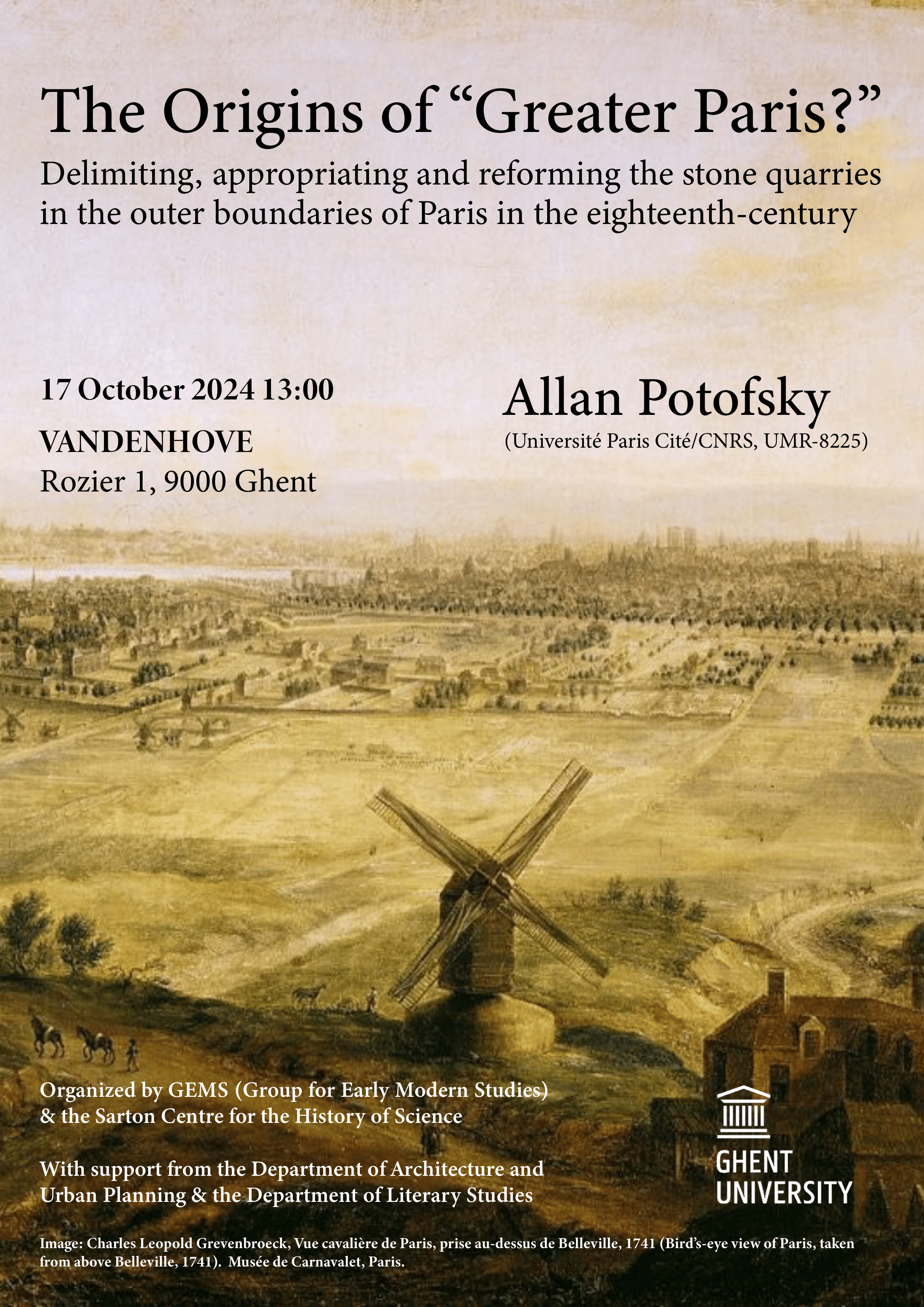
-
Mon23Sep20245pm-6pmBoekentoren (Rozier 9, 9000 Gent): Belvedere
Belvedere Lecture 2024
Show contentBelvedere Lecture 2024 – Monday 23 September 2024, 5-6 pm – Boekentoren (Rozier 9, 9000 Gent): Belvedere
New Perspectives on Early Modern Studies
The Belvedere Lecture is the Ghent annual lecture on early modern history and culture. It sheds light on the early modern period from a multi-disciplinary perspective. ‘Belvedere’ suggests a bird-eye view on early modern history, which is indeed one of the aims of this annual lecture: to invite international scholars in the field of early modern studies to present their research in the light of bigger questions early modernists are dealing with today.
‘Belvedere Lecture’ refers to the Belvedère of the Ghent famous Boekentoren (Book Tower), an iconic building designed in 1936 by Henry van de Velde (more information about this buildng on https://tour.boekentoren.gent). Belvedere is an architectural structure that was especially popular in the renaissance and baroque, but also in modern architecture. It not only refers to the idea of providing an scenic view on early modern history, but it also connects early modernity with modernity.
Speaker: Prof. Frans-Willem Korsten (Leiden University)
‘From dry milling lakes to the production of sugar: Internal and external colonialism and the issue of legal and historical irresponsibility’
Starting in the early modern period, and in the course of just a few centuries, a so-called plantation culture has come to dominate the relations between humans and their environment, leading up to what Donna Haraway called the Plantationocene. This type of cultivation was not developed especially for the colonies. In the Netherlands, for instance, the dry milling of lakes in the 17th century resulted in commons being turned into the private property of investors who would then rent out the neatly cut up polders to those who had to work the land. More broadly, juridically speaking, the appropriation of land was covered by a tactic of enclosure, as Sylvia Federici proposed: a certain amount of land was marked off from the rest and declared property. When, then, a few European nations engaged in what was to become a colonial endeavor, Europe’s internal form of colonialism was exported to colonies elsewhere. There, likewise, European newcomers brutally created tangible and juridical fences that indicated: “This is now property.” The windmills that facilitated the dry milling of lakes, the le
gal definitions that facilitated the constitution of property, the machines that made the production of sugar possible, they are all examples of what Bernhard Siegert called ‘cultural techniques’. Such techniques take humans up in a loop. They are not techniques that humans consciously use, but media that redefine human subjectivity. As such they pose problems of (ir-)responsibility, both legally and historically. These, in turn, have their implications for a decolonial reconsideration of history.
Registration before 16 September.
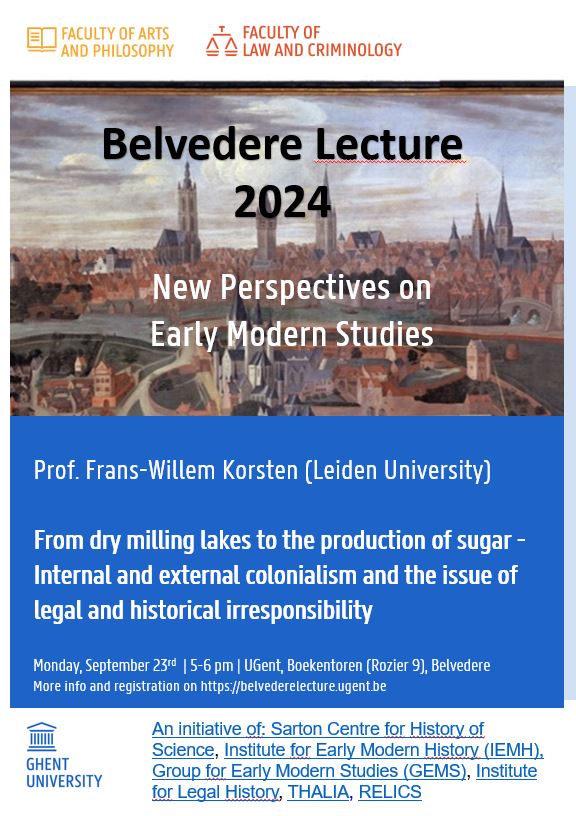
-
Tue03Sep202411:00room Camelot, Campus Boekentoren
Seminar by Prof. Dr. Paola Ugolini ‘“A Woman Dressed in Gold (…) Holding Out Her Heart.” Sincerity in Early Modern Italy.’
Show contentGroup for Early Modern Studies, Sarton Centre for History of Science and UGent Doctoral School are organising a seminar by Prof. Dr. Paola Ugolini (University at Buffalo, USA).
The seminar will take place on the 3rd of September at 11am in room Camelot, Campus Boekentoren.
Prof. Dr. Paola Ugolini will present her paper ‘“A Woman Dressed in Gold (…) Holding Out Her Heart.” Sincerity in Early Modern Italy.’, followed by a 10-minutes response given by Prof. Dr. Katinis (director of GEMS). The last 40 minutes will be reserved for open debate with the participants.
Early modern culture is known for devoting a unique amount of attention to accessing and revealing one’s interiority. Poets dreamed of a “crystal heart” that would show the authenticity of their feelings. Authors of physiognomic manuals explained how physical features could help understand a person’s moral character. In medical texts, dissected bodies were portrayed as lifting their skin, disclosing the secrets of human anatomy. Studies such as Lionel Trilling’s Sincerity and Authenticity and John J. Martin’s “Inventing Sincerity, Refashioning Prudence” have formulated the assumption that the notion of sincerity as a moral value is a creation of the Renaissance, while in earlier societies the term “sincere” was used exclusively to refer to a substance or an object that was pure or unadulterated. Prof. Dr. Paola Ugolini intends to put this assumption to the test, while also trying to identify the reasons that could have prompted such a change. Furthermore, she plans to investigate the contrast between the urge for sincerity and the need for simulation and dissimulation that characterized early modern society. In her research, she also explores the claims of sincerity expressed by the authors of early modern scientific texts, and how this intersects with the idea of accessing the secrets of Nature
Prof. Ugolini holds a doctorate from New York University. Since 2020 she has been an associate professor at the University at Buffalo, where she teaches Italian and Global Gender and Sexuality Studies. She has also been a visiting professor at the University of Bologna in 2021, and has been invited to give lectures at universities across North America and Europe. She has published on a wide array of Renaissance Italian writers, including Pietro Aretino (on which she also co-edited a volume; (2021)), Ludovico Ariosto (2017; 2022; 2024), Veronica Franco (2024), Veronica Gambara (whose poems she edited and translated; (2014)), and Gaspara Stampa (2024). She is currently co-editing a volume titled Women Warriors in the Early Modern World (under contract with Amsterdam University Press) and working on a book project on the history of sincerity in early modern Italy.
-
Mon27May2024Fri31May2024Het Rustpunt (Burgstraat 110/116, Ghent)
Medieval and Early Modern Studies Spring School 2024
Show contentLandscape History & Ecology – Ghent, 27-31 May 2024
This Spring School is organised by Ghent University (Doctoral Schools), University of Groningen, the Huizinga Institute and the Dutch Research School for Medieval Studies to stimulate contacts and exchange between PhD candidates and ReMa students in the field of cultural history, art history, historical geography, urban history, archaeology, early modern history, medieval history, literary studies, environmental psychology, environmental design and engineering, sustainability studies and environmental education. The course will mainly focus on the Middle Ages and the Early Modern Period, but students working on Antiquity or the Modern Period can attend as well.
Topic
Climate change, depletion of natural resources, loss of natural and cultural landscapes, and many other (ecological) sustainability challenges urge us to (re)evaluate human interaction with the natural world. This renewed environmental consciousness has invigorated not only scientists working on effects in the present and solutions for the future, but also those who study the (distant) past. It has become clear that we need to take the story back(much) further than the industrialisation of the second half of the eighteenth century. Specifically in medieval and early modern studies, scholars have uncovered the deep historical backgrounds of the anthropogenic ecological challenges, including (over)exploitation of natural landscapes, diminishment of open space, deforestation, food production, use of energy and water, fauna and flora extinctions et cetera. Over the past decades, ever more research has been conducted into the ecological impact and implications of practices in different landscapes. Also the traces of environmental mentalities in art and the cultural representation of human interactions with the environment is a flourishing field, strongly influenced by ecocritical approaches. The Spring School will therefore pay attention to a wide range of ecological issues in history related to the landscape of city, country and colony and their mediation in cultural production, most notablyliterature and art. It combines a focus on the medieval and early modern period with an multidisciplinary perspective, attending to the theoretical and methodological background of landscape and cultural history, ecocriticism and archaeology.
Approaches
This course takes four topics and methodologies related to historical landscape and ecology as a starting point:
(A) History of the city and the country,
(B) Archaeology and landscape history,
(C) Artistic representation and ecocriticism,
(D) Ecology and economy.
Ten specialists will reflect from their scholarly background (landscape history, archaeology, literary studies, cultural history) on ecological issues in their own research. An accompanying reading list gives rise to further reflection and discussion with the participants. This will offer students a framework to think theoretical concepts and methodologies through in relation to their own work. Through short pitches the attending PhD students will reflect on the possibilities and difficulties of working with the same concepts and methodologies in their own research projects. A guided bike tour on the ecology of the city Ghent and its surroundings will be part of the programme, as well as an excursion to the Zwin-region and Zeeland Flanders, with presentations and discussions ‘in the field’.
Programme
Session I: Visit Exhibition ‘Ghent’s Lands’ & Bike Tour – Guide: Esther Beeckaert (Ghent Museum for Urban History STAM)
Session II & III: History of the City and the Country- Lecturers: Tim Soens & Iason Jongepier (UAntwerpen)
Session IV: Archaeology and Landscape History – Lecturer: Wim De Clercq (UGent)
Session V: Landscape History and Garden Culture – Lecturer: Willemieke Ottens (Rijksuniversiteit Groningen)
Session VI: Workshop ‘Nature Writing’ – Lecturer: Femke Kramer (Rijksuniversiteit Groningen)
Session VII: Artistic Representation & Ecocriticism – Lecturer: Joana van de Löcht (Universität Freiburg)
Session VIII & IX: Ecology and Economy – Lecturers: Marrigje Paijmans (University of Amsterdam), Charlotte Kießling (University of Cologne) & Thijs Lambrecht (Ghent University)
Registration
PhD students and ReMa students are invited to register for this course before 12 January 2024 through the following link: https://forms.gle/hQUuu4SVfs4wTRsq9 Please note that there is a limited number of places available for this course. After your registration you will soon receive more information about whether your registration can be confirmed or not. Some of the participating graduate/doctoral schools will cover tuition and lodging for their participating members (please wait for more information after your registration).
Organising institutions and partners
This Spring School is organised by Ghent University (Doctoral Schools), the University of Groningen, the Huizinga Institute and the Research School for Medieval Studies in cooperation with the following research groups: the Group for Early Modern Studies (UGent), the Henri Pirenne Institute for Medieval Studies (UGent), the Amsterdam Centre for Studies in Early Modernity (UvA), the Groningen Research Institute for the Study of Culture (Rijksuniversiteit Groningen), the Centre for Urban History(UAntwerpen), the Institute for Early Modern History (UGent-VUB) and the Onderzoeksgroep Nieuwe Tijd (KU Leuven). The Spring School was also made possible by the Rudolf Agricola School for Sustainable Development (University Groningen).
Organising committee
Caroline Baetens, MA (UGent, Group for Early Modern Studies), Dr. Femke Kramer (Rijksuniversiteit Groningen, Research Institute for the Study ofCulture), Dr. Stefan Meysman (UGent, Pirenne Institute for Medieval Studies), Dr. Marrigje Paijmans (UvA, Amsterdam Centre for Studies in Early Modernity), Prof. Jeroen Puttevils (UAntwerpen,Centre for Urban History), Prof. Hanneke Ronnes (UvA / Rijksuniversiteit Groningen, Landscape History), Prof. Kornee van der Haven (UGent, Group for Early Modern Studies)
-
Wed15May2024Fri17May2024VANDENHOVE Centrum voor architectuur en kunst (Rozier 1, Ghent)
Conference: ‘Performing theatricality and imaging religious ceremonies in early modern Western Europe’
Show content2023 marks the 300th anniversary of the publication of the early eighteenth-century book series Cérémonies et coutumes religieuses de tous les peuples du monde, a work on all the world’s religions known to Europe at that time and originally published in seven volumes between 1723 and 1737 in Amsterdam. Edited by the exiled French Huguenot Jean Frederic Bernard, the original seven volumes of the Cérémonies knew a vast distribution across European readers in the Netherlands, France, England, and the Holy Roman Empire, among other countries. Its popularity was at least partly due to the impressive set of prints included within the books. After all, the engravings were for the most part manufactured by the exiled Parisian artist, Bernard Picart, who was known as one of Europe’s most distinguished engravers at that time.
More than ten years after the publication of some pioneering studies on the project – Religionsbilder der frühen Aufklärung (2006), The Book That Changed Europe (2010) and The First Global Vision of Religion (2010) – the intriguing ceremonies and customs of the various religions depicted in the books still capture the imagination. This is not only caused by their ingenuity regarding the comparative method of inquiry into religion in general, as earlier research widely acknowledged, but also because of their importance as an early modern compendium of imaging religious ceremonies. After all, as the title already indicates, the Cérémonies discusses global religious ceremonies and customs. It focusses on performing religion, instead of on religion as such.
In line with Picart and Bernard’s project, this conference aims to focus on the ways in which early modern Europeans related to religious ceremonies of all kinds, ranging from customs that were familiar to Western Europe’s everyday religious life, to rituals from peoples across the globe that were still rather alien to early modern Europeans. How did early modern Europeans perceive religious rituals practiced in other parts of the world, particularly those in overseas territories? To what extent did early modern knowledge production on religious customs contribute to the development of early anthropology and ethnography in the latter half of the eighteenth century? How did representations of religious rituals either endorse or challenge existing knowledge on various religious practices? In what ways did the early modern period witness a shift toward a more encyclopedic approach to representing the ceremonies and customs of various religions, and how did this reflect broader intellectual trends of the Enlightenment era?
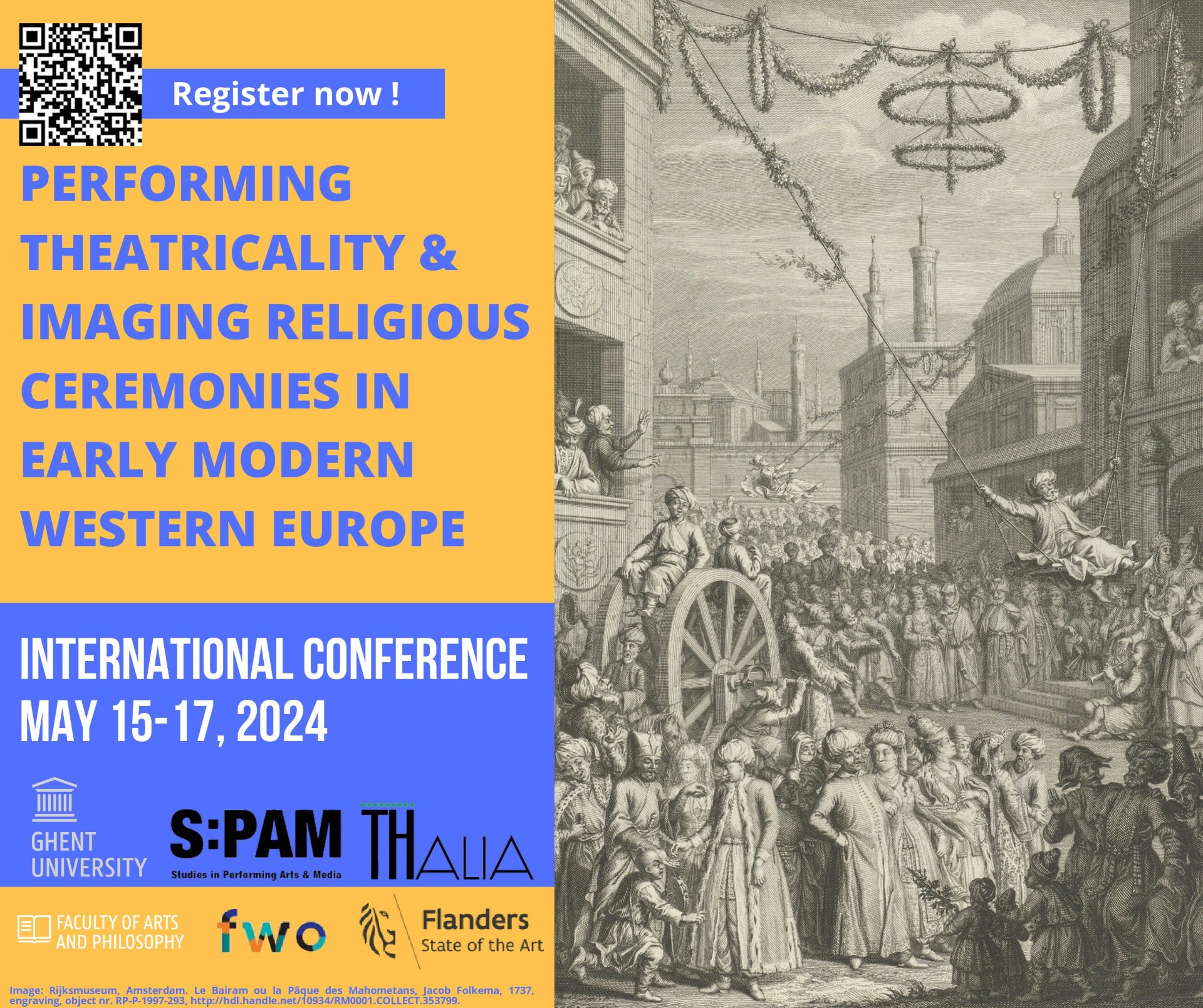
-
Mon22Apr202411:00Library Lab, Magnel Wing (Rozier 44, Ghent)
Young Researcher’s Day
Show contentJoin GEMS on the 22nd of April for the Young Researcher’s Day, a work-in-progress session by MA students where they will be presenting their research through a short poster presentation, with ample time for questions. The presentations aim to help students fine-tune their research and are a great opportunity to get feedback from their peers and other researchers in the field of early modern cultural history and literature.
Location: Library Lab, Magnel Wing – 11am-3pm
Presentations:
- Widow Immolation (Sati) as a Religious Practice: Crystallisation of a European Image of India in the 18th Century
- The Late Medieval and Early Modern in Macbeth: The Transgressive Power of Blood, the Body and the Supernatural
- European Science Theories in 18th Century Latin America: The Almanacs of Cosme Bueno
- Early Modern Death: The Function and Form of Death in Everyman, The Faerie Queene, “Death Be Not Proud”, Paradise Lost and The Pilgrim’s Progress
- Trauma and Cognition in 20th Century Fiction
- Asexuality in Media
We encourage researchers who are interested to attend and register through this form by the 17th of April. Lunch and refreshments will be provided. If you have any further questions, feel free to contact eru.fevery@ugent.be and caroline.baetens@ugent.be
We hope to see you there!
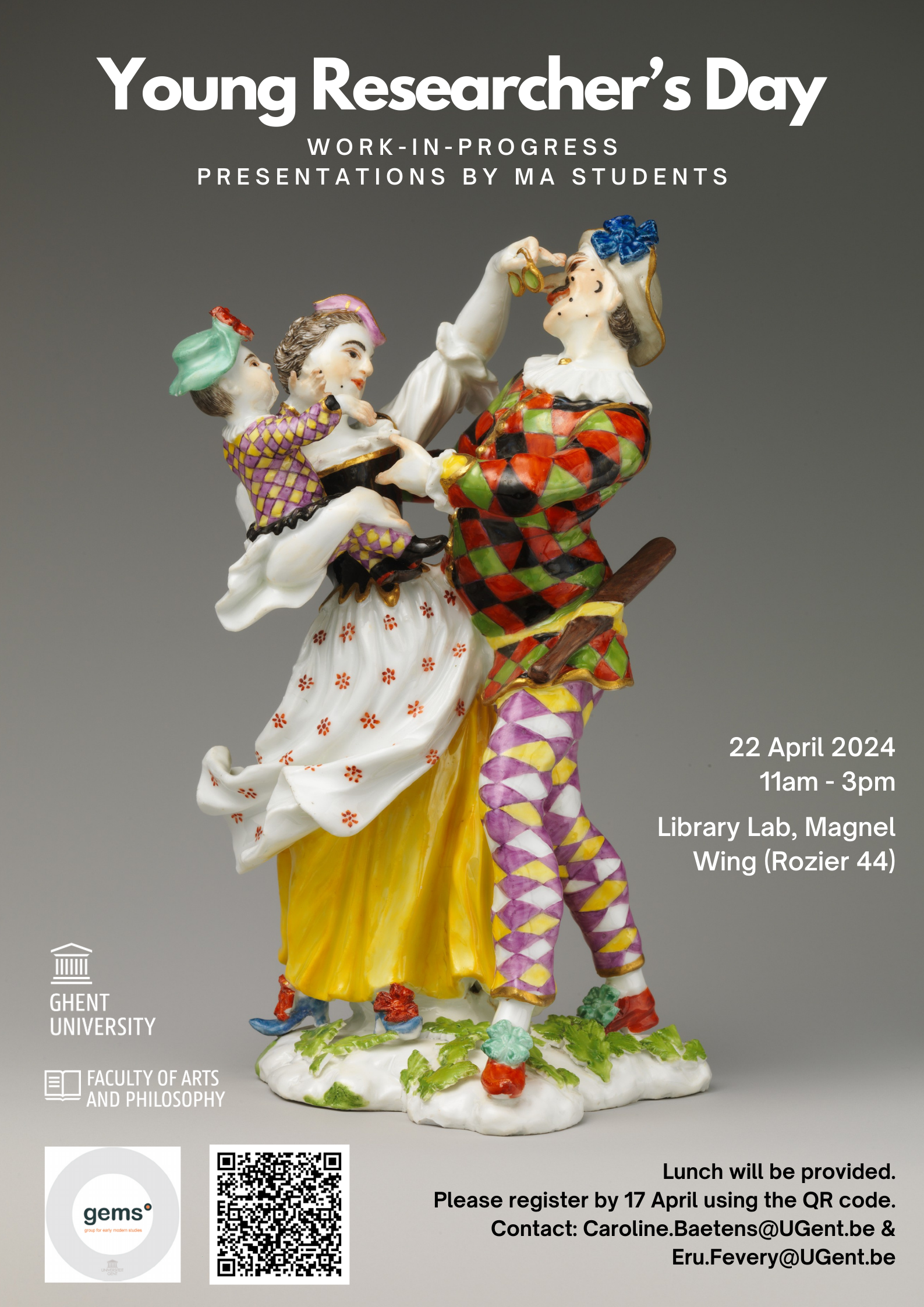
-
Mon15Apr202411:30Blandijn Room 1.14 (Blandijnberg 2, Ghent)
Lecture: Intellectual Freedom in Early Modern Women’s Spiritual Writings: Practice, Methods, and Identities
Show contentDr. Carme Font-Paz, Associate Professor of English Literature at Universitat Autònoma de Barcelona and director of WINK (Women’s Invisible Ink), is giving a lecture where she’ll be presenting the WINK project and her paper on ‘Intellectual Freedom in Early Modern Women’s Spiritual Writings: Practice, Methods, and Identities’.
The essence and manifestation of God’s love has been a major concern for men and women of faith over the centuries, and the object of mystical, fictional and analytical approaches to understanding the relationship between human and divine nature. This presentation will briefly examine the methodological challenges posed by narratives of faith and grace that seek to represent subjective reality as an experience of universal truth.
By paying special attention to four seventeenth-century women writers from different Christian backgrounds, we shall see in what ways their notion of intellectual freedom was constructed and invoked as the primary reason for writing and speaking in public against pastoral misconduct, social ills and domestic abuse within their congregations and communities of faith. Their arguments point at their own freedom of conscience, as well as the “hypocrisie” and superficiality of the alleged “liberty of conscience and freedom” of their own communities. They claim to be intellectually freer in their obedience to God.
This paper will bring to light Maria Jesus de Ágreda manuscript Leyes de la esposa (1637) for the first time, Arcangela Tarabotti’s La semplicità ingannata (1654), Susanna Parr’s Apologie against the Elders (1659), and Anne Wentworth’s A Vindication (1670). We will look at the discourse of divine love and personal conscience as a common feature of female spirituality and intellectuality within a European context, markedly influenced by Teresa de Ávila’s program for mental prayer. We shall discuss the relationship between literary genre and theological tradition, the limits of reason and the imagination as sources of knowledge, and the faint borderlines between obedience and freedom of conscience as paths for intellectual inquiry.
Dr. Carme Font-Paz is Associate Professor of English Literature at Universitat Autònoma de Barcelona. She is also an ICREA Academia fellow and director of the European ERC Starting Grant project WINK “Women’s Invisible Ink: Trans-Genre Writing and the Gendering of Intellectual Value in Early Modernity”. A specialist in prophetic genres and early modern women’s writing, her latest books are Women’s Prophetic Writings in Seventeenth-Century Britain (Routledge, 2017) and, with Nina Geerdink, Economic Imperatives for Women’s Writing in Early Modern Europe (Brill, 2018). She is now preparing her forthcoming monograph Women Writing on Social Change in Early Modern Europe (Brepols).
Contact: elizabeth.amann@ugent.be
-
Fri12Apr2024Sat29Jun2024Museum Het Warenhuis (Markt 2, 4571 BG Axel)
Exhibition: Vers uit de tuin. Petrus Hondius’ dichterlijke wegwijzer door het zeventiende-eeuwse landschap.
Show contentFrom the 12th of April until the 29th of June 2024 you can visit an exhibition co-curated by GEMS-members Kornee van der Haven and Caroline Baetens in collaboration with Piet de Blaeij from Museum Het Warenhuis. The exhibition centres around the early modern Dutch poem Dapes inemptae, of de Moufe-Schans (1621) in which Petrus Hondius celebrates his life in the garden the ‘Moffenschans’. You can explore the seventeenth-century garden life in this exhibition through Hondius’ verses. You walk through the garden and the poetry to get a unique picture of garden life in the seventeenth century. The garden comes to life as a place of pleasant gatherings, of plant science, of experimenting with nature and landscape, but also as a place where you can indulge in gardening.
For more information you can read the description in Dutch below:
Vers uit de tuin. Petrus Hondius’ dichterlijke wegwijzer door het zeventiende-eeuwse landschap.
Tentoonstelling UGent & Museum Het Warenhuis (Axel), 12 april – 29 juni 2024
Bij verse oogst uit de tuin denk je waarschijnlijk in de eerste plaats aan wortels of komkommer. In de zeventiende eeuw oogstten tuinbezitters niet alleen groenten, maar ook dichterlijke verzen uit de Zeeuws-Vlaamse grond! Die gedichten geven een inkijkje in hoe het rijke tuinleven in de zeventiende eeuw werd ervaren. Een van de eersten die over dat leven in de tuin dichtte, was predikant Petrus Hondius. In 1621 bezingt hij in zijn dichtwerk, Dapes Inemptae, of De Moufe-schans, alles wat er te beleven valt in zijn tuin bij Terneuzen (de Moffenschans): van maaltijden met groenten van eigen bodem, tot de kweek van zeldzame bloemen en uitstapjes door de omliggende velden.
Van 12 april tot 29 juni 2024 kun je in Museum Het Warenhuis te Axel via Hondius’ wandelpaden zelf het zeventiende-eeuwse tuinleven verkennen in de expositie. Je bewandelt de gangen van de tuin via het dichtwerk en krijgt zo een uniek beeld van het tuinleven in de zeventiende eeuw. De tuin komt tot leven als een plek van gezellige samenkomsten, van plantwetenschap, van experiment met natuur en landschap, maar ook als een plaats waar je je kunt uitleven in het tuinieren. Wie weet herken je je eigen ervaringen wel in Hondius’ verzen of leiden zijn wandelpaden je tot nieuwe inzichten over de hedendaagse tuin!
Veel idealen uit Hondius’ poëzie zijn herkenbaar voor een hedendaagse lezer. Net zoals stedelingen vandaag aan de drukte trachten te ontsnappen in een tuin of park, zochten diegenen die daar de mogelijkheid toe hadden ook in de zeventiende eeuw de rust van het platteland op. De Terneuzense predikant geeft dan ook uitdrukking aan die herkenbare drang naar ontsnapping in een groen decor. Ook hedendaagse idealen van zelfvoorzienendheid of lokaal shoppen lijken al vroeg in die literatuur vorm te krijgen, want ook Hondius streeft naar ‘Ongekochte spijs’ of groenten van eigen bodem. Zijn verhaal schetst niet alleen een uniek beeld van het rijke tuinleven in de zeventiende eeuw, maar biedt dus ook een leidraad voor reflectie op onze bedrijvigheid in de tuin vandaag.
Als je het museum uit stapt, kun je de wandeling verderzetten en met een nieuwe blik het landschap rondom verkennen. Op een boogscheut van het museum vind je een laatnegentiende-eeuws landhuis dat nog steeds de naam ‘Moffenschans’ draagt, naar Hondius’ tuin die zich daar eeuwen eerder bevond. Te voet, te paard of te vloot bereist Hondius vandaaruit de polders, schorren, duinen en rivieren rondom zijn tuin. Hij treedt buiten de omheining en legt een breder beeld van het Zeeuws-Vlaamse landschap vast in woord. In de expositie leer je dus iets nieuws over de zeventiende-eeuwse beleving van de directe omgeving van de tuin en het hedendaagse museum.
Ontdek wat het Zeeuws-Vlaamse tuinleven in de zeventiende eeuw zo uniek en toch zo universeel maakt, van 12 april tot 29 juni 2024 in Museum Het Warenhuis (Markt 2, 4571 BG Axel).
Dit project is een samenwerking tussen Museum Het Warenhuis en de Vakgroep letterkunde aan de Universiteit Gent. De expositie kwam tot stand met de steun van de Faculteit Letteren en Wijsbegeerte van de Universiteit Gent, het Maatschappelijk Valorisatiefonds van de Universiteit Gent, het Fonds Wetenschappelijk Onderzoek – Vlaanderen en het Scheldemondfonds.
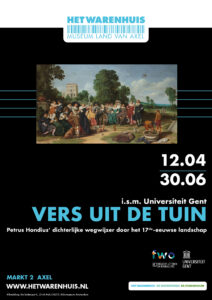
-
Thu22Feb202416:00Meeting Room Avalon (3rd Floor, Blandijnberg 2)
Book presentation: Repertoires of Slavery: Dutch Theater Between Abolitionism and Colonial Subjection, 1770-1810
Show contentJoin GEMS on the 22th of February for a Book Presentation by dr. Sarah J. Adams. She will present her new book Repertoires of Slavery: Dutch Theater Between Abolitionism and Colonial Subjection, 1770-1810 (University Press Amsterdam, 2023). Through the lens of a hitherto unstudied repertoire of Dutch abolitionist theatre productions, Repertoires of Slavery prises open the conflicting ideological functions of antislavery discourse within and outside the walls of the theatre and examines the ways in which abolitionist protesters wielded the strife-ridden question of slavery to negotiate the meanings of human rights, subjecthood, and subjection.
For more information and to order the book, you can follow this link
Please let us know if you can attend by the 16th of February via this link
